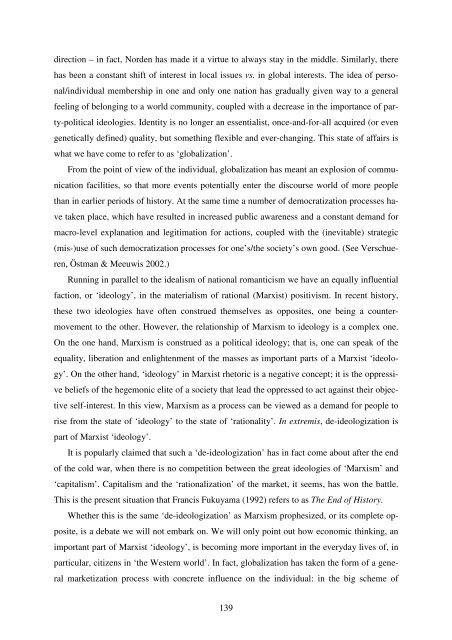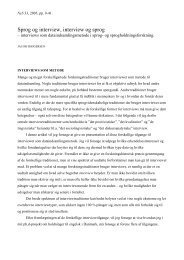Hør dog hvad de siger - Note-to-Self: Trials & Errors
Hør dog hvad de siger - Note-to-Self: Trials & Errors
Hør dog hvad de siger - Note-to-Self: Trials & Errors
Create successful ePaper yourself
Turn your PDF publications into a flip-book with our unique Google optimized e-Paper software.
direction – in fact, Nor<strong>de</strong>n has ma<strong>de</strong> it a virtue <strong>to</strong> always stay in the middle. Similarly, there<br />
has been a constant shift of interest in local issues vs. in global interests. The i<strong>de</strong>a of perso-<br />
nal/individual membership in one and only one nation has gradually given way <strong>to</strong> a general<br />
feeling of belonging <strong>to</strong> a world community, coupled with a <strong>de</strong>crease in the importance of par-<br />
ty-political i<strong>de</strong>ologies. I<strong>de</strong>ntity is no longer an essentialist, once-and-for-all acquired (or even<br />
genetically <strong>de</strong>fined) quality, but something flexible and ever-changing. This state of affairs is<br />
what we have come <strong>to</strong> refer <strong>to</strong> as ‘globalization’.<br />
From the point of view of the individual, globalization has meant an explosion of commu-<br />
nication facilities, so that more events potentially enter the discourse world of more people<br />
than in earlier periods of his<strong>to</strong>ry. At the same time a number of <strong>de</strong>mocratization processes ha-<br />
ve taken place, which have resulted in increased public awareness and a constant <strong>de</strong>mand for<br />
macro-level explanation and legitimation for actions, coupled with the (inevitable) strategic<br />
(mis-)use of such <strong>de</strong>mocratization processes for one’s/the society’s own good. (See Verschue-<br />
ren, Östman & Meeuwis 2002.)<br />
Running in parallel <strong>to</strong> the i<strong>de</strong>alism of national romanticism we have an equally influential<br />
faction, or ‘i<strong>de</strong>ology’, in the materialism of rational (Marxist) positivism. In recent his<strong>to</strong>ry,<br />
these two i<strong>de</strong>ologies have often construed themselves as opposites, one being a counter-<br />
movement <strong>to</strong> the other. However, the relationship of Marxism <strong>to</strong> i<strong>de</strong>ology is a complex one.<br />
On the one hand, Marxism is construed as a political i<strong>de</strong>ology; that is, one can speak of the<br />
equality, liberation and enlightenment of the masses as important parts of a Marxist ‘i<strong>de</strong>olo-<br />
gy’. On the other hand, ‘i<strong>de</strong>ology’ in Marxist rhe<strong>to</strong>ric is a negative concept; it is the oppressi-<br />
ve beliefs of the hegemonic elite of a society that lead the oppressed <strong>to</strong> act against their objec-<br />
tive self-interest. In this view, Marxism as a process can be viewed as a <strong>de</strong>mand for people <strong>to</strong><br />
rise from the state of ‘i<strong>de</strong>ology’ <strong>to</strong> the state of ‘rationality’. In extremis, <strong>de</strong>-i<strong>de</strong>ologization is<br />
part of Marxist ‘i<strong>de</strong>ology’.<br />
It is popularly claimed that such a ‘<strong>de</strong>-i<strong>de</strong>ologization’ has in fact come about after the end<br />
of the cold war, when there is no competition between the great i<strong>de</strong>ologies of ‘Marxism’ and<br />
‘capitalism’. Capitalism and the ‘rationalization’ of the market, it seems, has won the battle.<br />
This is the present situation that Francis Fukuyama (1992) refers <strong>to</strong> as The End of His<strong>to</strong>ry.<br />
Whether this is the same ‘<strong>de</strong>-i<strong>de</strong>ologization’ as Marxism prophesized, or its complete op-<br />
posite, is a <strong>de</strong>bate we will not embark on. We will only point out how economic thinking, an<br />
important part of Marxist ‘i<strong>de</strong>ology’, is becoming more important in the everyday lives of, in<br />
particular, citizens in ‘the Western world’. In fact, globalization has taken the form of a gene-<br />
ral marketization process with concrete influence on the individual: in the big scheme of<br />
139



